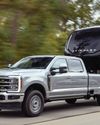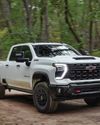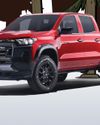
I’ve heard all the supposed arguments. It seems every time anything even tangentially related to electric cars is published, certain people feel compelled to share their own research. You’ve probably heard it all,
too: A Prius is worse for the planet than a Hummer. EVs are coal-powered cars. Electric cars produce more CO2 than internal combustion engine (ICE) vehicles. Lithium mining is uniquely bad for the environment. Cobalt mining relies largely on slave labor, if not child slave labor. Actually, that last part is sadly true. But the rest? Lies. And I’m not even going to get into the hypocrisy of posting anti-EV rhetoric from a lithium-ion battery-powered phone or laptop.
The first thing we should talk about is direct versus indirect emissions. Gas-powered vehicles have both direct and indirect emissions, while electric cars—I’m specifically talking about battery-powered vehicles or BEVs, but we will just call them EVs—only have indirect emissions. How so? Both types of cars/trucks/SUVs are manufactured, and the process of building cars involves a global manufacturing effort that uses energy from all sorts of sources. This includes everything from the diesel fuel used to mine and transport metal to the electricity used to manufacture tires. A big knock on EVs is that because most battery production is centered in China, itself a notorious coal-burning country, battery-powered cars begin their service lives with more indirect emissions to their credit.
Diese Geschichte stammt aus der April 2023-Ausgabe von Motor Trend.
Starten Sie Ihre 7-tägige kostenlose Testversion von Magzter GOLD, um auf Tausende kuratierte Premium-Storys sowie über 8.000 Zeitschriften und Zeitungen zuzugreifen.
Bereits Abonnent ? Anmelden
Diese Geschichte stammt aus der April 2023-Ausgabe von Motor Trend.
Starten Sie Ihre 7-tägige kostenlose Testversion von Magzter GOLD, um auf Tausende kuratierte Premium-Storys sowie über 8.000 Zeitschriften und Zeitungen zuzugreifen.
Bereits Abonnent? Anmelden

2023 GMC Canyon
MC, the luxe-truck division of General Motors, has long struggled to differentiate its products from mechanically similar Chevrolets.

2023 Ford F-Series Super Duty
The heavy-duty truck world moves more slowly than other pickup classes, and progress comes in spurts. Take the Ford F-Series Super Duty, whose recent refresh included softer-edged styling, a new entry-level gas-fed V-8, a new high-output 6.7-liter turbodiesel V-8, and myriad small improvements like new bedside steps. Is it still basically the same truck as before? Absolutely, but it’s also a better Super Duty, however incrementally.

2024 Chevrolet Silverado HD
When Chevrolet unveiled its all-new 2020 Silverado HD lineup, it set the truck world ablaze, and not in a good way.

THE CHEVROLET COLORADO IS THE 2024 MOTORTREND TRUCK OF THE YEAR
A BROAD LINEUP DELIVERS AN IMPRESSIVE RANGE OF OFF-ROAD CAPABILITY WITHOUT COMPROMISE TO EVERYDAY LIVABILITY

HOW MUCH DO YOU LOVE THE 80?!
THE FIRST-GENERATION NISSAN PATHFINDER IS AN SUV THROWBACK TO A TOTALLY RAD TIME, FOR SURE

BAVARIAN ECONS 2002te
THIS ELECTRIC BMW RESTOMOD LOSES ITS ENGINE BUT NOT ITS SOUL

2023 PORSCHE 911 GT3 RS FIRST TEST
PORSCHE'S MOST FOCUSED 911 OF ALL TIME MUST BE EXPERIENCED AT ITS LIMITS TO BE UNDERSTOOD

2024 TRUCK OF THE YEAR MADE IN MICHIGAN
AFTER DECADES IN THE WEST, TRUCK OF THE YEAR MOVES TO MICHIGAN
YOUR ICON OF ICONS: CHEVROLET CORVETTE
Was there ever any doubt? MotorTrend readers are largely American, and as much as we love Jeeps, Mustangs, and F-150s in this country, the Corvette has been “America’s sports car” for nearly as long as this publication has existed. That’s why you chose it via our online vote as the most iconic car of the past 75 years.

MOTORTREND CELEBRATES 75 YEARS OF EXCELLENCE
The 10 Most Iconic Vehicles of Our Time and Much More